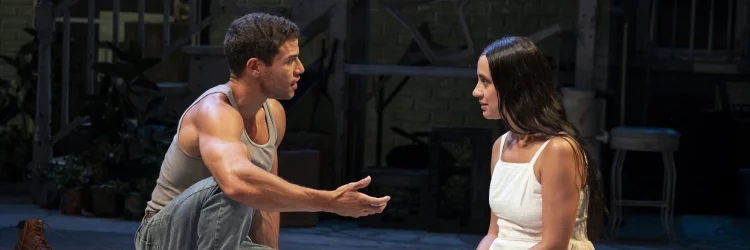Review of Mojada at the Public Theater
Once again, Luis Alfaro's genius is showcased in his ability to turn ancient Greek tragedy into compelling and timely modern theater with his latest offering at The Public Theater, Mojada. In this case, Euripides' Medea is the jumping off point for Alfaro as he morphs the Greek sorceress into a young Mexican wife and mother who crosses the border illegally with her husband, son and nurse. Mojada is a stunning glimpse into the circumstances of existence for those who choose the hell that is both the journey and the life of an illegal immigrant in this country now. For most, it is a life or death decision with no hope of return.
Mojada is set in Corona, Queens in the small, run-down backyard of Medea (Sabina Zúñiga Varela) and her husband Jason (Alex Hernandez), their 10-year-old son Acan (Benjamin Luis McCracken) and Tita (Socorro Santiago), the curandera who raised Medea from infancy when her mother died. There is a sewing machine on a little table and some struggling tropical plants and herbs. There is a stairway leading up to a little landing which has a doorway to their apartment. The ground is cracked concrete. This is Medea's world. Traumatized by the events of the journey to get to the United States, she cannot bring herself to leave the confines of their apartment and yard.
The only way Medea can escape is either through memory or magic. When Mojada opens, she is performing an ancient Aztec incantation that allows her, and us, to hear the sounds of her home in Mexico. When her son comes downstairs, she tells him "If you do this, Acan, you can make your way home" and they practice it together. But in the end, there's no way home for any of them.
Medea is described by Alfaro as a beautiful young indigenous woman. She is not sophisticated by any means, but she is not stupid. She has great gifts and works hard every day sewing shirts for men who take advantage of her illegal status by paying her $60 for 200 shirts that they sell for $398 each. Jason, her very handsome and charming husband is ambitious and hard-working. He has his eye on the prize and is willing to do whatever it takes to raise himself and his family out of the wrenching poverty and uncertainty that their lives have been. He has found himself a very good job with a construction company run by an older woman named Pilar (Ada Maris) who has taken a fancy to him and is not bothered by her attention. He sees it as merely a means to an end.
Alfaro manages to take the same raw events of the Greek version and, making the details and story as different as can be, come up with as moving and tragic a story as the original. He is aided by frequent collaborator, director Chay Yew, who has assembled a masterful cast and team of designers to bring his vision to life with passion and clarity. The synergy between the set design, projection design, lighting design, sound design and Yew's sensitive direction allows the flow between Corona, conjuring and the past to roll over the audience seamlessly.
And flawlessly navigating the rivers between memory, magic and the impossible as our guide, is Sabina Zúñiga Varela in the role of Medea. Moving back and forth between narrating the nightmare of their flight from Mexico, to meeting her husband's boss, to remembering her first meeting with her beloved husband without missing a beat, Varela exhibits exquisite skill. And Alfaro deserves kudos for understanding and making an immigrant woman's situation the focus of this story with equal skill.
(Photo by Joan Marcus)
WHAT THE OTHER CRITICS SAID
"The woman who dreams of flying has made a prison of her life. Portrayed with an impassive mien and a wounded gaze by Sabina Zúñiga Varela, the heroine of Luis Alfaro's spirited, mournful Mojada is first seen holding two outsize tropical leaves as if they were wings, like a bird about to take off. Yet in Mr. Alfaro's play, which opened on Wednesday night at the Public Theater, she remains hopelessly and helplessly in place in the tiny yard of the ramshackle house in Corona, Queens, that has become her provisional home."
Ben Brantley for New York Times
"Alfaro gives us just enough beauty to make us hang on grimly as the play gets hotter and hotter in our hands."
Helen Shaw for Time Out New York
"Director Chay Yew proves unable to provide the necessary theatrical urgency or make the play's mythical and contemporary elements blend into a coherent whole, although Haydee Zelideth's costumes are culturally apt and Mikhail Fiksel's sound design provides vivid atmospherics. The performances, to put it charitably, are uneven, with Varela proving more effective conveying Medea's haunted vulnerability than her subsequent descent into vengeful madness."
Frank Scheck for The Hollywood Reporter
"If a more harrowing immigrant trek from Mexico across the border and through Middle America has ever been presented on stage, I haven't seen it. From there, Alfaro closes in on Medea's predicament, turning her isolation into the most insane kind of claustrophobia."
Robert Hofler for The Wrap
Originally published on
